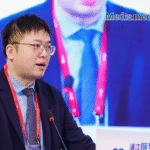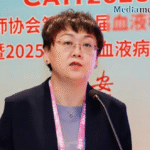
Editor’s Note: In early summer, the historic city of Xi’an welcomed a gathering of leading experts at the 19th Annual Meeting of the Chinese Association of Hematologists and the 2025 China Annual Hematology Conference (CAH 2025), held from June 20 to 22. The event was co-hosted by the Chinese Medical Doctor Association and its Hematology Branch, in collaboration with the National Clinical Research Center for Hematologic Diseases – Peking University Institute of Hematology, and the First Affiliated Hospital of Xi’an Jiaotong University.Indolent lymphomas, a group of malignancies that have gained increasing attention in recent years, were a key focus of the conference. During the meeting, Oncology Frontier – Hematology Bulletin invited Professor Lei Fan from Jiangsu Province Hospital for an in-depth discussion on the evolving approaches to the diagnosis and treatment of indolent lymphomas.
Oncology Frontier – Hematology Frontier: Indolent lymphomas are characterized by slow progression yet are notoriously difficult to cure. In recent years, what major changes have occurred in treatment strategies for these diseases? How do you view the balance between “active control” and “watchful waiting”?
Professor Lei Fan: Indolent lymphomas are a group of lymphoid malignancies that originate from mature lymphocytes and exhibit relatively slow progression. This category includes chronic lymphocytic leukemia (CLL), follicular lymphoma, marginal zone lymphoma, and Waldenström’s macroglobulinemia. These diseases share several features: morphologically, the malignant cells closely resemble their normal counterparts, making them prone to misdiagnosis or underdiagnosis in clinical practice. Clinically, they progress slowly and, unlike aggressive lymphomas, do not typically show rapid growth or acute deterioration in the short term.
However, indolent lymphomas are generally less sensitive to conventional chemotherapy and, in most cases, remain incurable. Historically, the primary treatment approach was chemotherapy, aimed at achieving short-term disease control through limited treatment cycles. But over the past couple of years, the emergence of novel agents—such as BTK inhibitors, BCL-2 inhibitors, and lenalidomide—has brought a significant shift in treatment paradigms. Therapy has evolved from being chemotherapy-centered to regimens based on combinations of targeted agents and novel therapies.
This shift toward combination therapy has led to marked improvements in both survival outcomes and treatment safety for patients with indolent lymphoma. In summary, with the continuous development of novel therapies, the treatment landscape and underlying philosophy for indolent lymphomas are undergoing a profound transformation, leading to sustained improvements in patient outcomes and quality of life.
Oncology Frontier – Hematology Frontier: For Chinese patients, do you believe there are unique challenges in diagnosis, risk stratification, and treatment response prediction? Are current international guidelines fully applicable to clinical practice in China?
Professor Lei Fan: Indolent lymphoma has become an increasingly recognized subtype of lymphoma in recent years. However, as China entered this field relatively late, clinical diagnosis, prognostic assessment, and treatment strategies have largely relied on guidelines developed in Western countries. While these guidelines are generally applicable, there are clear differences between Chinese and Western patients, particularly in terms of age at onset and disease incidence. For instance, the epidemiology of chronic lymphocytic leukemia (CLL) differs significantly between the East and the West.
Moreover, disparities in economic conditions and healthcare resources also influence treatment choices between countries. As a result, while international guidelines remain an important reference, clinicians in China are actively working to explore diagnostic and therapeutic pathways that better suit the Chinese population. This includes accumulating local real-world data to guide clinical decisions. With ongoing progress in China-specific research, I believe we are moving toward the development of localized guidelines for the diagnosis and treatment of indolent lymphomas that are better aligned with the realities of Chinese clinical practice.
Oncology Frontier – Hematology Frontier: Looking ahead, do you believe the management of indolent lymphomas will evolve toward a more precise and long-term chronic disease model? What key issues remain in achieving the goal of high-quality survival with disease?
Professor Lei Fan: Because indolent lymphomas are slow-progressing and difficult to cure, patients often have long survival periods—frequently exceeding 10 years or even longer. Although relapses and disease progression may occur during this time, remission can often be re-achieved with novel therapies. In recent years, as overall patient outcomes have continued to improve, we have gradually introduced the concept of “whole-life-cycle management” for indolent lymphomas, covering multiple subtypes such as chronic lymphocytic leukemia and follicular lymphoma.
With the widespread use of BTK inhibitors, BCL-2 inhibitors, and bispecific antibodies, survival for some patients has extended from under 10 years to more than 15 years, approaching that of the general population. Experts in China, including our center, have started building a standardized framework that encompasses diagnosis, treatment timing, relapse management, long-term monitoring, and the handling of complications.
By promoting the implementation of a comprehensive life-cycle management approach, we aim to further improve the long-term prognosis and quality of life for patients with indolent lymphoma in China.

Department of Hematology, Jiangsu Province Hospital
· Director, Department of Hematology, Jiangsu Province Hospital
· Chief Physician, Professor, Doctoral Supervisor
· Member, Hematology Branch, Chinese Medical Doctor Association
· Standing Committee Member, Hematologic Oncology Committee, Chinese Anti-Cancer Association
· Youth Committee Member (11th Term), Hematology Branch, Chinese Medical Association
· Chair, Lymphoma Committee, Jiangsu Medical Doctor Association
· Standing Committee Member, Hematology Branch, Jiangsu Medical Association
· Vice Chair, Hematology Branch, Nanjing Medical Association
· Postdoctoral Fellow, NewYork-Presbyterian Hospital, affiliated with Columbia and Cornell Universities, New York, USA
Research Focus: Precision diagnosis and treatment of lymphoid malignancies.


